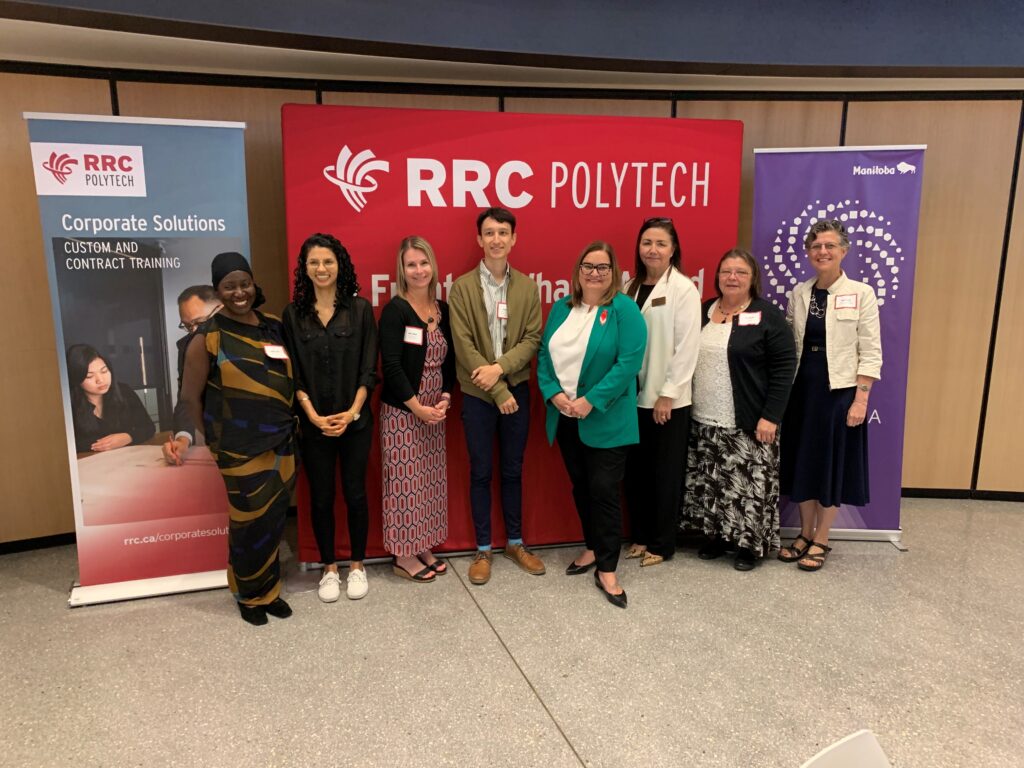College delivers exclusive training to support workers in homeless and family violence shelters
This week, RRC Polytech celebrates the first cohort of students to successfully complete its Shelter Support Worker Micro-credential program, designed with industry partners to address skill gaps, meet community needs and improve staffing levels and delivery service in homeless and family violence shelters across the province.
Supported by Gender Equity Manitoba, the program is the first of its kind in Manitoba, and the result of a collaborative effort between the College and the Manitoba Association of Women’s Shelters (MAWS). It aims to provide essential skills and knowledge for individuals involved in or aspiring to work in homeless and family violence shelters.
“The successful class we are celebrating today will have an immediate impact providing frontline services and support to Manitobans in need of refuge,” says Dr. Christine Watson, Vice-President Academic. “Their accomplishment highlights the power of partnership and reinforces RRC Polytech’s strength of adapting our learning model quickly to respond to the evolving demands of our community by delivering crucial training through micro-credentials.”
Courses in the virtually delivered program include basic terminology and concepts, fundamental skills with specialization in homeless shelter support or women’s shelter support, a capstone project and a 20-hour practicum for learners to gain real world experience.
Trained students from the following communities are prepared to enter or re-enter the workforce with a deeper understanding of the sector and the ability to provide trauma-informed care:
• Winnipeg
• Blumenort
• Beausejour
• Brandon
• West Pine Ridge
• Thompson
• Nelson House
• Stanley
• Manigotogan
“Going from needing a shelter at one point in my life to working at one is a bit surreal for me, but my lived experience has made me passionate about helping others — and now that I have the skills to make a difference, I can be a positive force,” says student Steven Hunter, who was hired at the end of his practicum.
“Based on my personal journey, I feel the program provides valuable insight and understanding into the diverse cultures and struggles of people in need.”
Just over a year ago, the province committed $450,000 through the Canada-Manitoba Workforce Development Agreement to fund the creation of the micro-credential program in an effort to address the sector’s recruitment and retention challenges, which have negatively impacted daily shelter operations and client service delivery.
“Manitoba Family Violence (FV) shelters have struggled for years to attract and retain qualified long-term applicants because of a historical lack of consistent and quality trauma-informed training designed specifically for the FV sector,” says Deena Brock, Provincial Coordinator at MAWS. “These staffing challenges were compounded by the pandemic, affecting the life-saving frontline work of caring for clients who are increasingly presenting with complex needs.”
“This micro-credential pilot program allows the family violence and homeless sectors to build capacity, reduce barriers to care, and better support those affected by gender-based violence and housing instability.”

